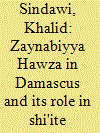|
|
|
Sort Order |
|
|
|
Items / Page
|
|
|
|
|
|
|
| Srl | Item |
| 1 |
ID:
140997


|
|
|
|
|
| Summary/Abstract |
Most of the literature related to Israeli intelligence on the eve of the 1973 Yom Kippur War refers to its failure, mainly because it did not provide an early warning. The flawed intelligence assessment rendered in October 1973 has been studied intensively and remains the subject of much public and professional debate. More than a decade ago, Israeli scholar Uri Bar-Joseph studied the most recently released evidence and came to the conclusion that the deficient deployment of the Israeli army, the Israel Defense Force (IDF), was the result of the absence of a sufficient intelligence warning, which was at the root of the Israeli failure at the start of the war.1 In his book, The Watchman Fell Asleep, Bar-Joseph tried to shed light on the circumstances and causes of the Yom Kippur attack by Egyptian and Syrian forces on Israeli positions at the Suez Canal and the Golan Heights on 6 October 1973. The evidence suggests that an important circumstance accounts for the surprise effect of these actions, despite ample warning signs thereof, is traceable to a significant need for cognitive closure among major figures in the Israeli intelligence establishment. Such a need may have prompted leading intelligence analysts to “freeze” on the conventional wisdom that an attack was unlikely, and to become impervious to information suggesting that it was imminent. The discussion here considers the psychological forces affecting intelligence operations in predicting the initiation of hostile enemy activities, and describes possible avenues of dealing with psychological impediments to open-mindedness that may pervasively characterize such circumstances.
|
|
|
|
|
|
|
|
|
|
|
|
|
|
|
|
| 2 |
ID:
092494


|
|
|
|
|
| Publication |
2009.
|
| Summary/Abstract |
The purpose of the present article is to examine the system of Shi'ite religious instruction in the Zaynabiyya awza in Damascus. As background we discuss the historical development which brought about the establishment of Shi'ite awzas and the evolution of Shi'ism in Syria. We analyze the reasons for the founding of the Zaynabiyya awza in Damascus, the causes of its great success, conditions for acceptance to the awza, the number of students, classrooms, teaching methods, the schedule, the language of instruction, official vacations and breaks, sources of financial support, stages of instruction and the curriculum of each stage, projects associated with the awza, the administrative building, the services it provides for its students, the awza's prospects for the future, its political role, and the Zaynabiyya awza's distinctive features in comparison to other Shi'ite institutions of the same kind.
|
|
|
|
|
|
|
|
|
|
|
|
|
|
|
|
|
|
|
|
|